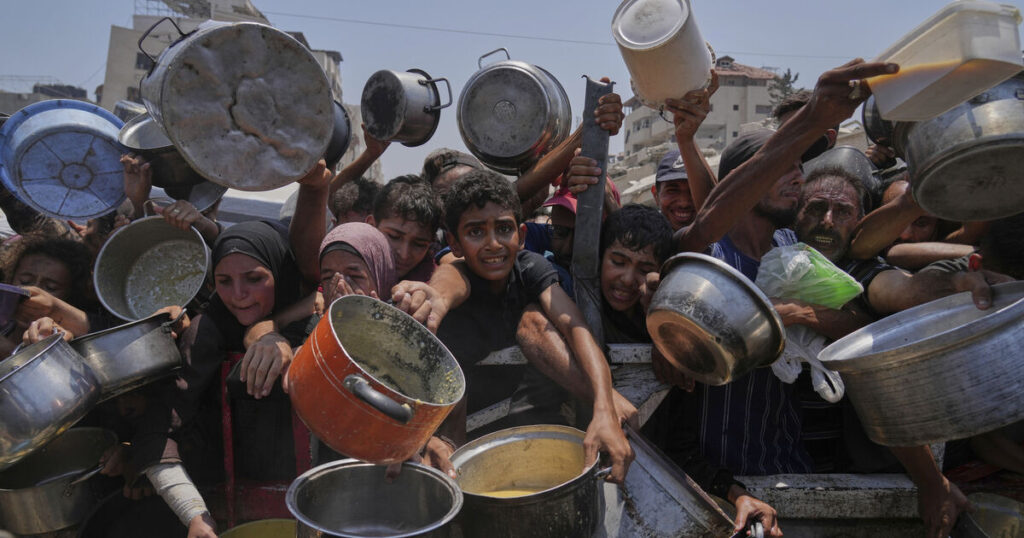The Israeli military has announced a 10-hour daily pause in fighting in three populated areas of Gaza to facilitate aid delivery to Palestinians in dire need.
This decision aims to alleviate the growing hunger crisis in the region, as Israel faces increasing international scrutiny regarding its actions during the ongoing 21-month conflict.
The military described the initiative as a “tactical pause” in Gaza City, Deir al-Balah, and Muwasi – regions with significant civilian populations – to enhance the distribution of humanitarian aid.
These pauses will be in effect from 10am to 8pm (7am to 5pm Irish time) daily, until further notice. These three areas have not seen renewed ground operations since March, when Israel’s offensive in Gaza resumed.
The military also stated that designated secure routes for humanitarian convoys transporting food and medicine will be permanently established from 6am to 11pm.
In addition to the pauses, the military reported conducting aid airdrops into Gaza, providing packages containing flour, sugar, and canned food.
Egyptian state-affiliated Al Qahera News TV reported that aid shipments began moving from Egypt towards Gaza on Sunday.
On Thursday, the UN stated that such humanitarian pauses would allow for “the scale up of humanitarian assistance,” adding that Israel had not provided enough alternative routes for aid convoys, thereby hindering aid access.
For months, food experts have warned of the potential for famine in Gaza, where Israel has restricted aid, alleging that Hamas diverts goods to strengthen its control.
Recent images from Gaza depicting severely malnourished children have fueled international criticism of Israel, including from its allies, who have called for an end to the conflict and the resulting humanitarian crisis.
Israel clarified that these new measures would be implemented alongside its ongoing offensive against Hamas in other parts of Gaza.
The local pause in fighting follows a period of stalled ceasefire negotiations between Israel and Hamas. On Friday, Israel and the US appeared to have abandoned these negotiations, claiming that Hamas showed no desire for a deal.
After the collapse of the previous ceasefire in March, Israel completely cut off the entry of essential supplies, including food, medicine, and fuel, into Gaza for two and a half months. Israel stated at the time that this was intended to pressure Hamas to release hostages.
Facing international pressure, Israel slightly eased this blockade in May.
Since then, approximately 4,500 trucks carrying aid from the UN and other aid organizations have been allowed to enter Gaza for distribution.
However, the average of 69 trucks per day falls significantly short of the 500 to 600 trucks that the UN says are required to meet Gaza’s needs.
The UN reports difficulties in distributing much of the aid, citing instances where desperate crowds and gangs seize most of the supplies from arriving trucks.
As an alternative to UN aid delivery, Israel has supported the US-registered Gaza Humanitarian Foundation, which opened four centers in May to distribute food supplies.
The UN human rights office reports that more than 1,000 Palestinians have been killed by Israeli forces since May while attempting to obtain food, primarily near these new aid distribution sites.
Throughout the conflict, Israel has criticized the UN, claiming that its system allows Hamas to steal aid. However, Israel has not provided evidence to support these claims.
The UN denies these accusations and maintains that its delivery mechanism remains the most effective way to deliver aid to Palestinians.
The military has stated that these new measures have been implemented in coordination with the UN and other humanitarian organizations.
Much of Gaza’s population, increasingly confined to smaller areas due to the fighting, is now dependent on aid.
The war began with Hamas’s attack on southern Israel on October 7, 2023, which resulted in the deaths of 1,200 people, mostly civilians, and the capture of 251 hostages.
Hamas continues to hold 50 hostages, with over half believed to be deceased.
Israel’s retaliatory offensive has led to the deaths of more than 59,700 Palestinians, according to Gaza’s Hamas-run health ministry.
This count does not differentiate between militants and civilians, but the ministry reports that over half of the casualties are women and children.
The ministry operates under the Hamas government, and the UN and other international organizations consider it the most reliable source of data on casualties.
The war commenced on October 7, 2023, when Hamas-led fighters launched an attack on southern Israel, killing approximately 1,200 people, primarily civilians, and taking 251 hostages to Gaza.
Since then, Israel’s offensive against Hamas has resulted in the deaths of nearly 60,000 people in Gaza, predominantly civilians, according to Gaza health officials. The offensive has devastated much of the territory and displaced almost the entire population.
- Associated Press and Reuters


